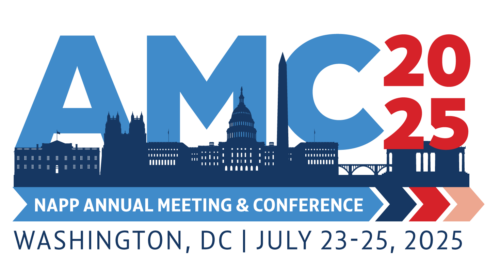
Get to know our speakers
July 23-25, 2025
American University Washington College of Law, Washington, DC.
Big thank you to our sponsors!
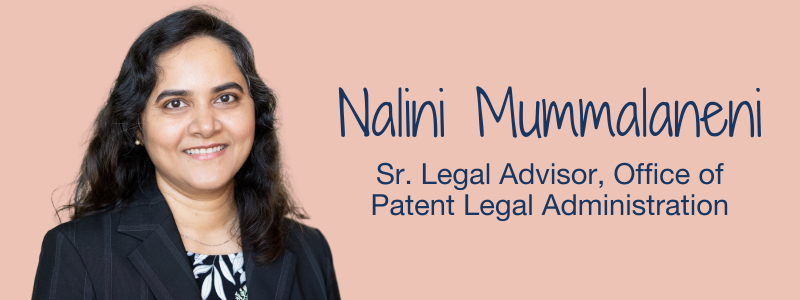
Nalini Mummalaneni is a Senior Legal Advisor in the Office of Patent Legal Administration (OPLA) at the USPTO. In this position, she drafts rule packages, memoranda, and associated guidance on topics such as subject matter eligibility under 35 U.S.C. 101 and disclosure requirements under 35 U.S.C. 112. Nalini also coordinates the development and implementation of patent examination guidance related to Artificial Intelligence and other emerging technologies at the USPTO.
Session: AI and Patent Prosecution
This session discusses the recent guidance issued by the USPTO on the use of AI-based tools in practice before the USPTO.
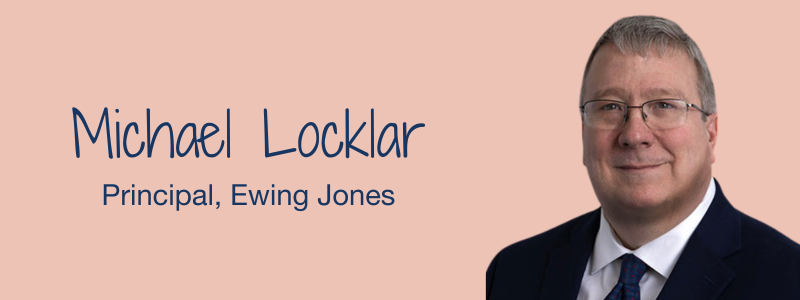
Michael G. “Mike” Locklar represents clients in a variety of fields, including chemicals, oil & gas, software, computers and computer hardware, electronics, consumer products, and medical devices. In his 23 years of IP practice, Mike’s practice has included litigation, prosecution, and transactional work.
Session: All things Revival
How proceed when your patent or patent application slips through the cracks.
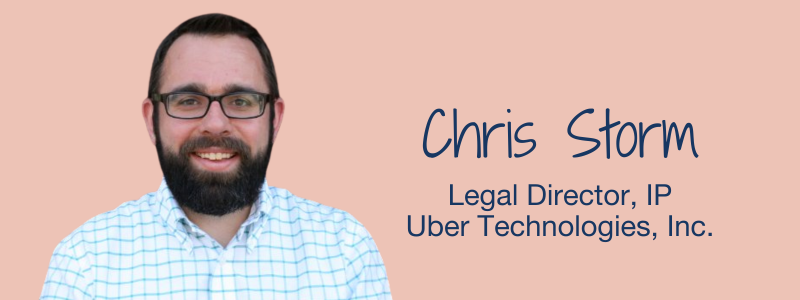
Chris Storm is an IP Legal Director at Uber Technologies, Inc., where he leads Uber’s IP policy initiatives and serves as head of IP for self-driving and other emerging transportation technologies. Past roles at Uber include both IP and non-IP positions managing legal support for self-driving, aerial ridesharing, and other emerging technologies. Before joining Uber, Chris served as an assistant general counsel for intellectual property at Bell Helicopter and as an associate at Baker Botts LLP. Chris received his B.S. (aerospace engineering) and M.S. (technology commercialization) from The University of Texas at Austin and his J.D. from the University of Houston Law Center.
Session: A Series of Historical Accidents: Development of American Patent Remedies
The story of American patent remedies is stranger than fiction. This presentation recounts the seemingly random events and figures that changed the course of patent history.
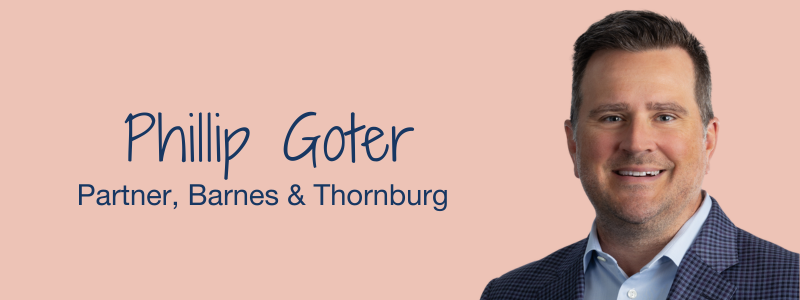
I advise entrepreneurs on innovation with an eye toward commercialization and monetization of their intellectual property. While I have litigated cases for and against patent owners, I most often represent patent owners and frequently on a contingent or funded basis. Having worked for one of the world’s largest litigation funders, I am very familiar with the funding market and requirements of a strong funding opportunity.
Session: Patent Litigation Funding
In Patent Litigation Funding, I discuss the funding process, disclosure requirements of various courts, privilege and discovery issues in funded cases, and issues in funded cases unique to patent law.
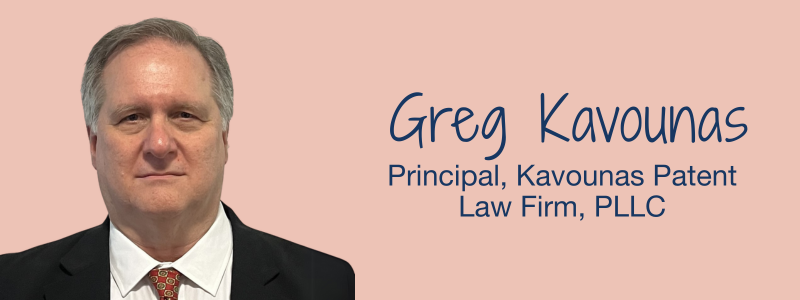
Greg Kavounas has been a patent attorney for over 30 years, of which 10 were in various in-house positions, defining the patenting of an operating company. He has authored the book Patent Ready, and has published articles in the industry about how to patent more robustly and how company management should think about patenting.
Session: Patenting From In-House
Being a patent practitioner in-house a company presents unexpected opportunities to improve the eventual patent portfolio of one’s company. In addition to the patenting, the in-house patent practitioner can take additional, measured actions that can have a disproportionately high positive impact in the future. Counterintuitively, such actions are not considered today because the stakeholders are focused instead on meeting present goals.
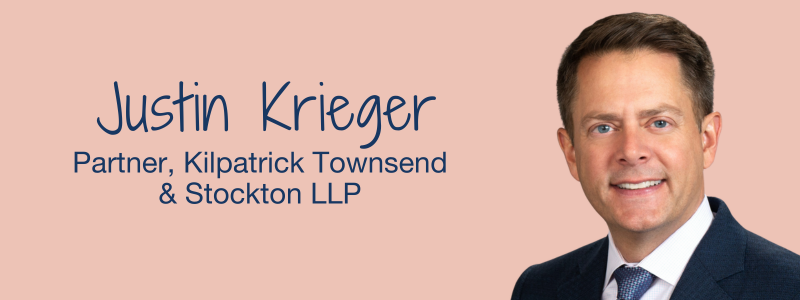
Justin Krieger serves as the Managing Partner for Kilpatrick’s Denver Office. He is a first chair IPR litigator with an over 90% win rate representing both petitioners and patent owners. Mr. Krieger also serves as an adjunct professor at the University of Denver Sturm College of Law, where he teaches a course of PTAB litigation. Justin is a frequent speaker on PTAB practice and was named “People’s Choice” Best IP Litigator in 2021 and 2024 by Law Week Colorado.
Session: What Every Patent Prosecutor Should Know About PTAB Trials (IPRs & PGRs)
In this presentation, Justin Krieger will provide a broad overview of IPR and PGR litigation before the US Patent Trial and Appeal Board (PTAB). Learn about current trends and developments in this specialized forum. The discussion will address what prosecutors need to know about these proceedings, with a particular emphasis on factors considered for institution, motions to amend, and patent owner estoppel.
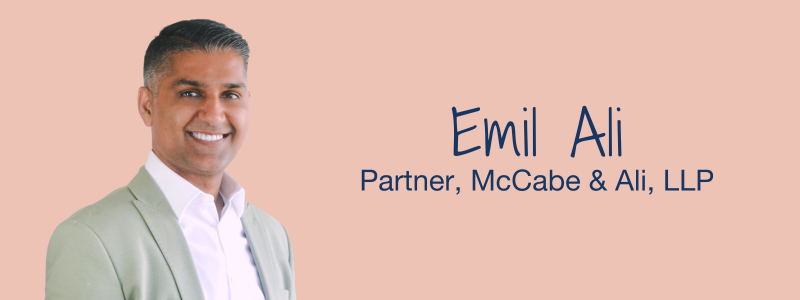
Emil J. Ali is a partner at McCabe & Ali, LLP where he focuses his practice on helping lawyers understand their obligations under state and federal law. As a registered patent attorney, a significant focus of his practice involves advising lawyers and law firms on all aspects of the intersection of IP and ethics matters. Emil’s work includes counseling clients on lateral transitions, malpractice avoidance, expert opinion and testimony, and respondent’s defense work before various bars and courts. You can view his musings on IP ethics issues at www.ipethicslaw.com.
Session: Traps, Gaps and Mishaps: IP Cautionary Case Tales & The Lessons Learned
Traps, Gaps and Mishaps: IP Cautionary Case Tales & The Lessons Learned This presentation will focus on specialized ethical issues facing IP practitioners who are registered to practice in patent matters before the USPTO. The presenter, a registered patent attorney who focuses his practice on ethics for IP practitioner, will discuss topics including malpractice avoidance and risk management, as well as specific ethics requirements applicable under the USPTO Rules of Professional Conduct, and their interplay with state rule counterparts. The presentation will include real world examples regarding the use of AI, conflicts, and inequitable conduct.
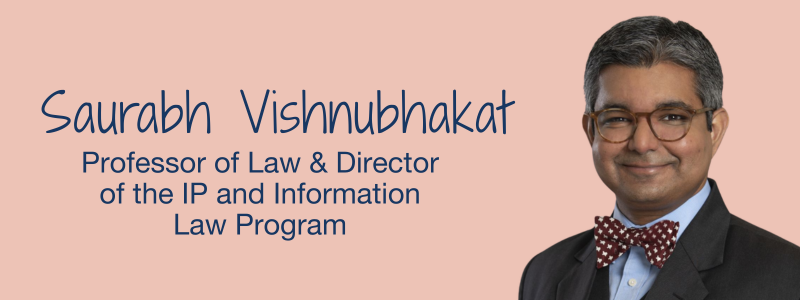
Saurabh Vishnubhakat is a Professor of Law and Director of the Intellectual Property & Information Law Program at the Benjamin N. Cardozo School of Law. He is also a Research Fellow at the Duke Law Center for Innovation Policy and a Senior Scholar at the George Mason University Center for Intellectual Property & Innovation Policy. Professor Vishnubhakat writes and teaches on intellectual property, administrative law, civil procedure, and remedies, especially from an empirical perspective.
Session: USPTO Powers after Loper Bright
This talk will discuss the Supreme Court’s recent decision in Loper Bright v. Raimondo and its likely effects for administrative actions of the USPTO. In Loper Bright, the Supreme Court overturned the Chevron doctrine requiring courts to defer to federal agencies’ reasonable interpretations of ambiguous laws that these agencies are tasked with administering. The effects of Loper Bright on the USPTO are more elusive given the agency’s historical lack of substantive rulemaking authority and relatively undeferential treatment by the Federal Circuit.
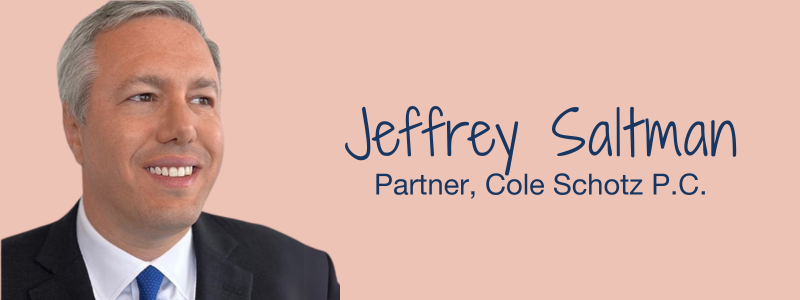
Jeff Saltman is a partner at Cole Schotz LLP who has managed a variety of federal court litigation matters from the initial pleadings phase through trial, including direct and cross examinations of fact and expert witnesses at trial, drafting and arguing of successful dispositive and Daubert motions, conducting every facet of discovery, preparing technical and economic expert reports, and drafting direct and cross-examination witness outlines at trial. Jeff has taken or defended over 100 depositions in federal court, including corporate representatives, economic and technical expert witnesses, and c-suite executives. Jeff has participated in six successful jury trial verdicts in federal court. In 2018, Law360 selected Jeff as one of six Rising Stars for intellectual property in the country–one of only six attorneys honored that year. Jeff was been selected as a SuperLawyer’s Rising Star on seven occasions.
Session: Reasonable Royalties & Prosecution: How Patent Drafting Can Affect Damages
How the scope of patent claims can affect reasonable royalty damages. That includes what products are covered by the claim, what part of a product can be included in damages, and the rate a party can seek.
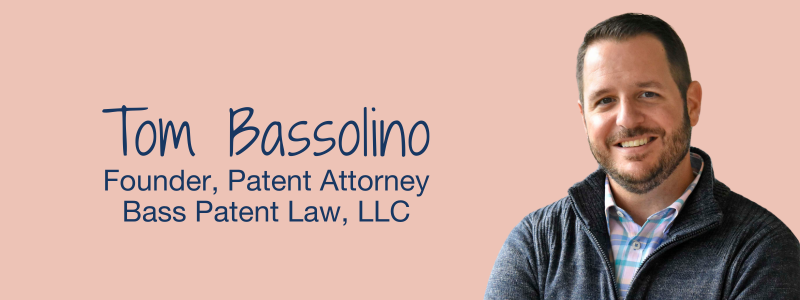
Tom Bassolino is a U.S. patent attorney with over 17 years of experience, and the founder of Bass Patent Law, LLC—a firm based in Frederick, Maryland that provides a broad range of patent-related services across a variety of technologies. Tom’s practice includes drafting, filing, and prosecuting U.S., PCT, national stage, and international patent applications, as well as other patent-related services, including global patent portfolio management and due diligence, and the preparation of noninfringement, invalidity, patentability, and freedom-to-operate opinions. Prior to practicing patent law, Tom worked as a mechanical engineer in New York City, eventually attending law school at night before starting his legal career in “biglaw.”
Session: Heard around the NAPP Forum
This presentation distills key discussions from NAPP’s online patent forum, offering insights into emerging patent law and technology trends, as well as salient practice tips shared by experienced patent practitioners. In the presentation, we’ll explore actionable takeaways and salient practice strategies that can directly impact and improve your practice, ensuring you stay ahead in an ever-evolving IP landscape.
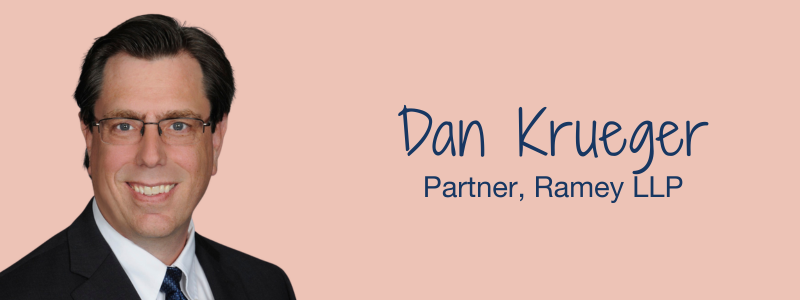
With his doctoral degree in Electrical Engineering, Dan is able to perform in even the most complex areas of technology. He has earned the respect and loyalty of clients in many fields including computer architecture, software engineering, digital communications, coding, seismic data processing, oil field drilling technology and well logging. Dan is highly skilled in patent prosecution, opinion work, litigation support and “design-around” assistance. Dan also performs due-diligence and freedom-to-operate searches and assists his clients in developing strategic patent portfolios.
Session: Ethics of Overflow Work
Overflow work raises several interesting ethical issues concerning client identification, restricted communications, supervision, fee division, etc. This presentation is my attempt to identify and address these issues head on.
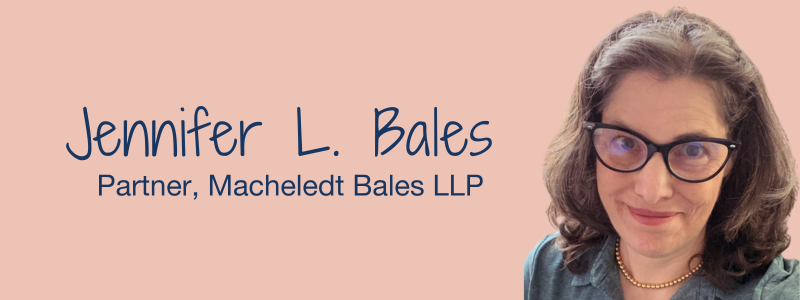
Jennifer Bales was employed as an engineer with Hughes Aircraft Company prior to law school at the University of Colorado. While at Hughes, Jennifer developed systems for digital signal processing, image processing and radar, while attaining a master’s degree in optics from University of Southern California. Jennifer has extensive experience obtaining and enforcing patents in the fields of signal processing, optics, optoelectronics, radar, and lidar. She is currently a partner in the intellectual property firm Macheledt Bales LLP.
Session: Expert Opinion Declarations in Patent Practice: Benefits and Pitfalls
When a patent practitioner and a patent examiner are in a stalemate, it is sometimes useful to provide an expert opinion, either from an outside expert or from one of the inventors. They can be very persuasive in the right situation. However, they can also be useless or even harmful if used carelessly or in the wrong situation.
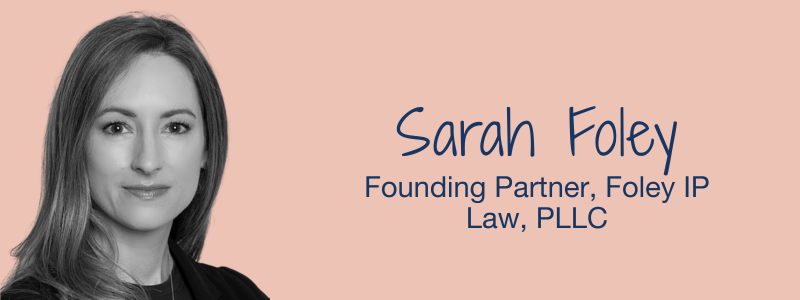
Sarah Foley is a registered U.S. patent attorney with over 18 years of experience counseling clients in all areas of intellectual property law. Over the course of her career, Ms. Foley has helped clients protect innovation in areas such as mobile device software and hardware, IoT and connected systems, image and natural language processing, network architecture, virtual and augmented reality, AI and computer learning, aerospace, aeronautics, robotics, autonomous vehicle systems, machinery, automotive and mechanical technologies. In 2023 she founded Foley IP Law, PLLC, a boutique Intellectual Property Law firm, and now manages an experienced team of IP professionals serving clients around the world.
Session: Drive to Survive: Prosecution Practices that Drive Value for Clients
Directed prosecution, competitive analysis, and targeted prosecution practices to drive value for clients and align with specific business goals.
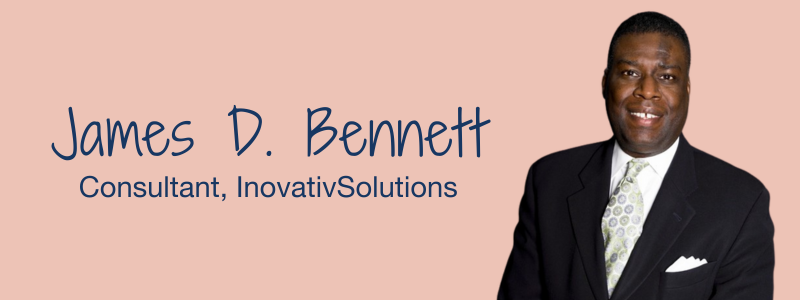
James D. Bennett, II is a Patent Agent/Engineer Consultant in Pearland, Texas that provides engineer consultation on legal and technical matters and tax and patent law. He provides expert witness testimony services, patent prosecution, technology licensing, IP portfolio management and R&D analysis services for accounting firms, law firms, the individual inventor, universities and small to mid-size businesses.
Research & Development Tax Credits and Patent Box: The Tax Incentive Benefits No One Seems to Know or Talk About

Tiffany Johnson is the IP Legal Director at Boston Scientific Corporation (BSC), where she supports the Neuromodulation Division. Before joining BSC, she was a Patent Attorney at The Estée Lauder Companies in New York. Prior to going in-house, Tiffany was an associate at IP boutique firms and an examiner at the USPTO. Tiffany earned her law degree from Texas Southern University, Thurgood Marshall School of Law and holds a Bachelor of Science in Mechanical Engineering from Texas A&M University.
Innovation Without Barriers: Creating an Accessible Patent System
This presentation explores strategies to make the invention process more inclusive, particularly for inexperienced and unaware inventors within a company. The presentation will emphasize the importance of collaboration with human resources and Employee Resource Groups (ERGs) to gather insights and data that can identify and reach potential inventors who may lack familiarity with the patent system. By leveraging these partnerships, the initiative aims to create a supportive environment that demystifies the patent process, encourages diverse participation, and fosters innovation across all employee demographics. The ultimate goal is to build a more equitable innovation ecosystem that empowers all inventors to contribute their ideas confidently.
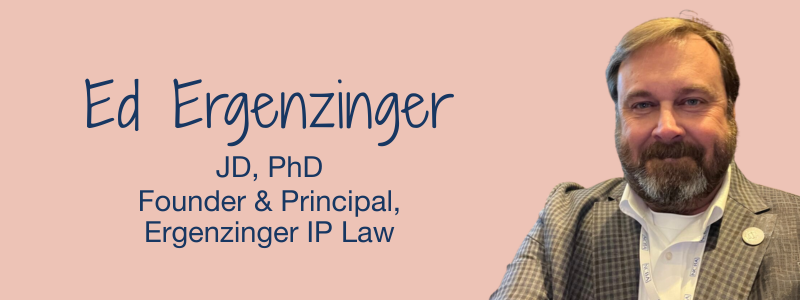
Ed Ergenzinger, JD, PhD, is a patent attorney and mental health advocate with 25 years of experience in the practice of patent law. His interest in mental health issues stems from his doctoral training in neuroscience and his personal experience living with bipolar I disorder, an anxiety disorder, and complex PTSD. He has a solo practice and also serves as senior counsel to boutique firms in Washington D.C. and New York City. Ed is also an adjunct professor at Wake Forest Law where he developed and teaches the upper-level seminar: Mental Health and the Legal Profession.
Zen and the Art of IP Law
The complex and often high-stakes nature of intellectual property law can exact a heavy toll on IP attorneys. Explore mental health and substance use issues in the practice of law from an IP perspective. Topics include: (1) factors that contribute to anxiety, depression, and substance use disorder in IP practices; (2) what law firms and in-house counsel can do to support mental health in the IP field; and (3) attorney coping tools and information on support services.
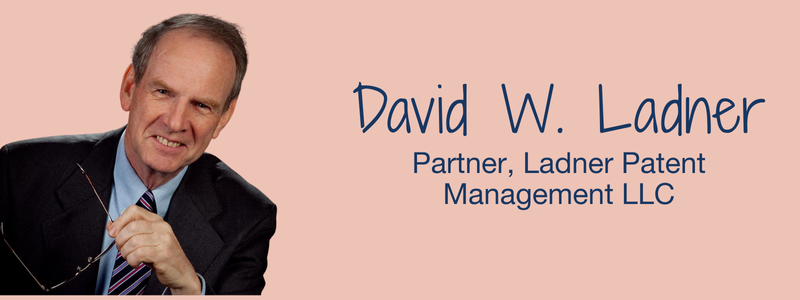
David W. Ladner earned his B.S. in Chemistry from The Pennsylvania State University and a Ph.D. in Synthetic Organic Chemistry from the University of Georgia, where he worked under the direction of Professor Richard K. Hill. Following two postdoctoral research associate positions, first at the University of Washington with Dr. Niels Andersen and then at Syntex, S.A. with Dr. Joseph Muchowski, Dr. Ladner became a Research Chemist with American Cyanamid in Princeton, NJ. He designed, carried out and directed the synthesis of organic compounds useful for crop protection and is himself a named inventor on more than 20 U.S. patents. At Cyanamid he served as Group Leader, Senior Group Leader and a Research Manager in the Herbicide Discovery Section and was awarded the Cyanamid Scientific Achievement Award for his role in designing potent, selective, and short residual herbicides. Dr. Ladner became a Registered Patent Agent in 2000 and was appointed as the Patent Liaison in Chemical Research for Bayer Pharmaceuticals in West Haven, CT. He was responsible for drafting and assembling patent applications covering compounds useful in the treatment of Cancer, Diabetes, Obesity and Osteoporosis. During that time, he also earned an M.B.A. in Pharmaceutical Management from Fairleigh Dickinson University.
Following positions as the in-house Manager of Intellectual property at a number of small pharmaceutical and diagnostic companies, Dr. Ladner established Ladner Patent Management LLC in 2009, where he continues to provide services to individual inventors and smaller startup Pharmaceutical and Biotechnology companies. His practice includes acting as a virtual in-house patent manager and preparing and prosecuting new patent applications.
Nuts & Bolt Moderator
The 2025 Nuts and Bolts Workshop will focus on the practical skills of claim drafting. Participants will be invited to submit real examples of claims, either recently submitted or in active prosecution, and to engage in a “live fire” amendment discussion with the faculty. Students may submit claims that are published in U.S. applications where help with amendments is needed, e.g., when about to submit a Preliminary Amendment in response to a PCT Search Report / Written Opinion, or for an ex-post review of a recent amendment. If no work-in-progress claims are submitted, the faculty will provide materials for an exercise. Students will observe the faculty’s thought processes as they strike sparks off each other and from fellow students’ input to produce amended claims
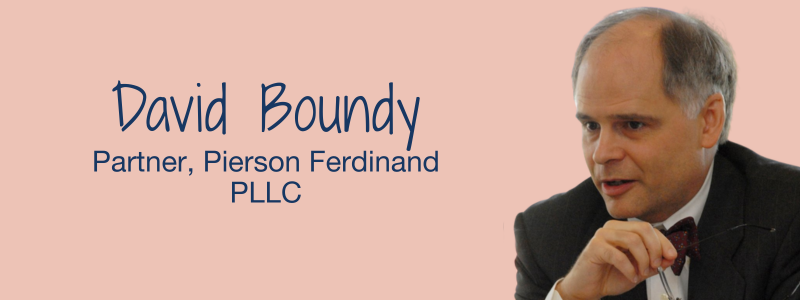
David Boundy is a partner at Pierson Ferdinand LLP. Mr. Boundy practices at the intersection of patent and administrative law, and consults with other firms on court and administrative agency proceedings, including PTAB trials and appeals. In 2007–09, Mr. Boundy led teams that successfully urged the Office of Management and Budget to withhold approval of the USPTO’s continuations, 5/25 claims, information disclosure statements, and appeal regulations under the Paperwork Reduction Act. In 2018, the Court of Appeals for the Federal Circuit asked Mr. Boundy to lead a panel of eminent administrative law academics and the President’s chief regulatory oversight officer in a program at the court’s Judicial Conference on administrative law issues. Judge Plager recommended Mr. Boundy’s article, David E. Boundy, The PTAB is Not an Article III Court, Part 1: A Primer on Federal Agency Rulemaking, 10 Landslide (Amer. Bar Assn.) 9-13, 51-57 (Nov.-Dec. 2017), to the patent bar. Another recent article, David Boundy, The PTAB is Not an Article III Court, Part 3: Precedential and Informative Opinions, 47 AIPLA Q.J. 1 (2019) explains the role of sub-regulatory guidance. Mr. Boundy is recognized as one of the IAM Worldwide Strategy 300 and 300 Global Leaders.
Patent Assignments
Consolidating ownership is as fundamental as any other criterion for patentability. If you don’t have ownership, you don’t have standing, and if you don’t have standing, you ain’t got nuthin’. Assignments require a bulletproof “adversary litigation” mindset, not an ex parte mindset.

Megan Miller is an attorney in Lathrop’s Intellectual Property practice group, where she helps clients navigate the full spectrum of IP and privacy law with a focus on strategic protection and growth. Her practice spans patents, trademarks, technology transactions, and data privacy across diverse industries including AI, pharmaceuticals, medical devices, and consumer products. Megan brings a unique perspective to her legal work, having started her career as an IP paralegal, which gives her a practical, business-minded approach to advising clients. A cum laude graduate of Mitchell Hamline School of Law, Megan sharpened her legal skills as a research assistant and executive editor of Cybaris: An Intellectual Property Law Review. She is a frequent speaker on patent and IP topics and currently serves as Chair of the Hennepin County Bar Association’s New Lawyers Section.
Passport to Patents: Powering Through the PCT
Join us for a practical walkthrough of the Patent Cooperation Treaty (PCT) process, led by experienced practitioners and authors of The Practitioner’s Guide to the PCT. This session offers strategies, real-world tips, and key insights to help you navigate each stage of the PCT with confidence.

Jay’s career spanned law practice, teaching, and international service. He served as expert witness, consultant, and advisor in litigation involving the PCT, Paris Convention, and other treaties before US, foreign, and international tribunals. Earlier, Jay was Director of the Office of the PCT at WIPO in Geneva, Switzerland, where he was responsible for reforming the PCT legal framework and expanding the PCT system. Jay continues to share his perspectives on international IP as a Professor Emeritus at Mitchell Hamline School of Law, and a visiting professor at the Vytautas Magnus University Faculty of Law in Lithuania and the KDI Graduate School of Public Policy and Management in Korea. He co-authored The Practitioner’s Guide to the PCT (first edition with Sam Helfgott and Dave Reed; revised edition with Megan Miller), published by the ABA, and he is a frequent speaker on issues in international IP policy.
Passport to Patents: Powering Through the PCT
Join us for a practical walkthrough of the Patent Cooperation Treaty (PCT) process, led by experienced practitioners and authors of The Practitioner’s Guide to the PCT. This session offers strategies, real-world tips, and key insights to help you navigate each stage of the PCT with confidence.
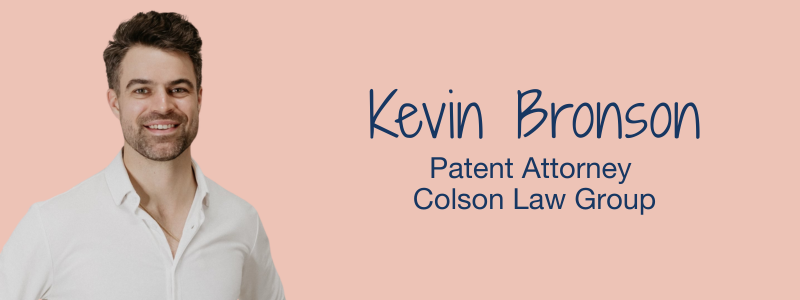
Kevin Bronson is a registered patent attorney with a B.S. in Biology from St. John Fisher College and a J.D. from the University at Buffalo School of Law. With a secondary technical background in robotics and a talent for both technical writing and illustration, Kevin offers comprehensive patent services—from drafting original applications to successfully prosecuting complex reissue matters. His practice also includes licensing work with universities and interfacing with federal programs for project funding. A former college lacrosse player, Kevin is also a proud husband and father, bringing the same discipline and commitment from the field to every client engagement. He loves the Buffalo Bills and a sunny day on the course.
“It’s Like Having Two of Me: Thank You, Qthena!”
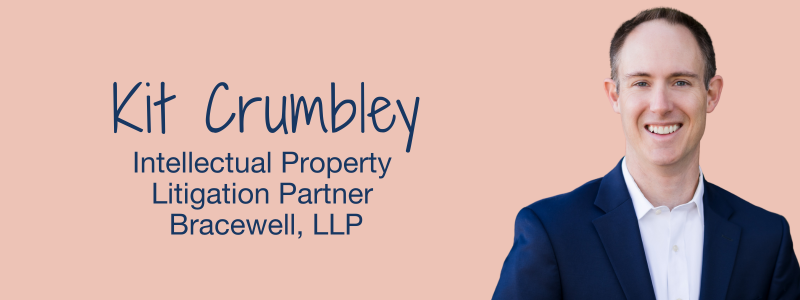
Kit Crumbley is an intellectual property litigation partner with the Austin office of Bracewell, with a particular focus on post-grant validity challenges at the PTAB and the appeals of those proceedings.
From 2012 to 2023, Kit served as an Administrative Patent Judge, including nearly seven years in PTAB leadership as a Lead Administrative Patent Judge. During his 11-year tenure with PTAB, he participated in more than 400 panels deciding the outcome of AIA petitions and ex parte appeals, and he personally authored over 100 decisions on institution and more than 70 final written decisions. He also frequently advised agency leadership and was deeply involved in significant PTAB and agency reform efforts, including PTAB’s Consolidated Trial Practice Guide, rulemaking on motions to amend and decision-making procedures.
Prior to being appointed to PTAB, Kit served for nearly a decade as a trial attorney with the Intellectual Property Section of the Department of Justice’s Civil Division, defending the government in patent litigation suits before the US Court of Federal Claims and appeals before the Federal Circuit. He is a graduate of the University of Virginia School of Law and earned degrees in Chemistry and Political Science from Rice University.
How PTAB Judges View Your Patents: Insights Every Prosecutor Needs to Know
Drawing on a former PTAB judge’s experience presiding over post-grant challenges, this session reveals how prosecution decisions that seem smart during patent prosecution may create vulnerabilities for challengers to exploit during IPRs and PGRs. Attendees will learn which claim language, specification choices, and prosecution strategies make patents more susceptible to successful challenges, and how to make different decisions that result in stronger, more defensible patents. This presentation provides insider perspective on how prosecution history appears to PTAB panels and actionable guidance for creating more challenge-resistant patents.

Peter-Anthony is a patent professional licensed to practice before the U.S. Patent and Trademark Office (USPTO). He serves as the Director of Intellectual Property (IP) Policy for the U.S. Senate Committee on the Judiciary under Senator Thom Tillis – Chairman of the Subcommittee on IP – to whom he advises on all IP matters (e.g., patent, copyright, trademark, trade secret).
Peter-Anthony also advises the Senator on tech policy (e.g., artificial intelligence, blockchain, etc.), antitrust, and Judiciary Committee nominations, including Supreme Court confirmation hearings. Previously, he served on detail as a Professional Staff Member for the U.S. Senate Committee on the Judiciary under Senator Tillis – then Ranking Member of the Subcommittee on IP.
Prior to his roles in the U.S. Senate, Peter-Anthony served on detail as the Special Advisor to the Under Secretary of Commerce for IP and Director of the USPTO. He advised the Director on IP, artificial intelligence (AI), and agency operational matters. Most notably, Peter-Anthony helped develop the 2019 “Revised Patent Subject Matter Eligibility Guidance,” a framework for how the agency could leverage AI for assisting in search during examination, and the first agency working group tasked with considering the interplay between AI and IP rights.
While at the USPTO Peter-Anthony served on the White House Office of Science and Technology Policy Networking and Information Technology Research and Development (NITRD) Subcommittee AI Research and Development Interagency Working Group and he served on the Department of Commerce Interagency Committee on Standards Policy (ICSP) AI Standards Coordination Working Group. He has also served in various other USPTO roles, including Patent Trial and Appeal Board Branch Chief, Supervisory Patent Examiner, and Primary Patent Examiner.

Will Covey is the Acting Deputy Under Secretary of Commerce for Intellectual Property and Acting Deputy Director of the United States Patent and Trademark Office (USPTO). He serves as the principal advisor to the Under Secretary of Commerce for Intellectual Property and Director of the USPTO, advising the Director and carrying out the agency’s policies, priorities, and programs.
Most recently, Mr. Covey was the Chief Advisor to the Under Secretary of Commerce for Intellectual Property and Director of the USPTO. He supported the Office of the Under Secretary and the USPTO on a wide variety of policy and operational matters.
Previously, Mr. Covey served as the Deputy General Counsel and Director for the Office of Enrollment and Discipline (OED) at the USPTO. Mr. Covey was responsible for ensuring that the nation’s patent attorneys and agents are of good moral character and sufficiently knowledgeable to practice before the USPTO. Mr. Covey’s team of attorneys and other professionals developed and administered a registration examination designed to measure an applicant’s knowledge of patent law and practice. Successful applicants were registered to practice by OED. In addition, OED investigated complaints of unethical conduct made against individuals practicing patent or trademark law before the USPTO.

David Grossman is a seasoned leader in innovation and intellectual property, currently serving as the Senior Director of Technology Transfer and Industry Collaboration at George Mason University. With a unique background spanning law, engineering, entrepreneurship, and education, David has successfully bridged the gap between academic research and industry impact.
He has prosecuted and monetized hundreds of patents—many to major multinational corporations—and has played key roles in several successful startups and nonprofit ventures. David also supervises pro bono patent cases at the Glushko-Samuelson Intellectual Property Law Clinic at American University.
Previously, he was Vice President of Intellectual Property at Ofinno LLC and an Adjunct Professor of Law at George Mason’s Antonin Scalia Law School. He has served as President of the National Association of Patent Practitioners and as Research Editor for The Journal of the Association of University Technology Managers. Earlier in his career, David led avionics and software development for rocket and satellite programs, including NASA’s X-34 rocket plane, and even designed toys for Fisher-Price. He holds a J.D., magna cum laude, from American University Washington College of Law, and a B.S. in Electrical Engineering from Penn State.
